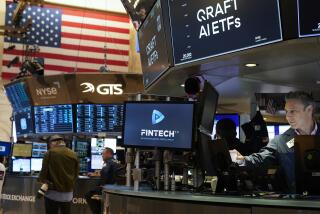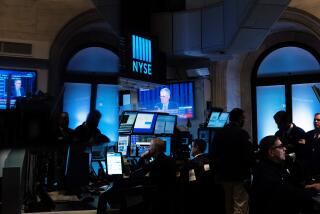Glitter of Perks May Distract Savers, Investors : Money: True to the adage about free lunches, experts caution against buying decisions based on the gifts offered.
- Share via
NEW YORK — In the money-management marketplace of the 1990s, even the giveaway promotions have gone upscale.
Ten or 15 years ago, the come-ons offered to savers and investors by financial marketers were mostly along the lines of a free toaster when you opened a bank savings account.
Today the inducements range from airline miles and baskets of a company’s products for new shareholders to discounts off the market price when you buy additional shares of stock.
Financial advisers welcome this trend, in the sense that it gives justified recognition to savers and investors as important participants in the U.S. economy, supplying a valuable commodity known as capital.
But at the same time, they caution, it’s important for individual or family money managers not to let the glitter of freebies and perks distract them from the business at hand.
“I’m sure an academician would say that a discount or freebie is hardly a reason for an individual to buy stock in a given company,” says Charles Carlson, editor of the investment advisory letter Dow Theory Forecasts, in his book “Free Lunch on Wall Street,” published by McGraw-Hill.
The blandishments have just begun to appear in the booming mutual-fund industry. In late August, for instance, the discount brokerage firm Jack White & Co. in San Diego announced that customers with brokerage accounts of $25,000 or more could earn air-travel points with money invested in the American AAdvantage Money Market Fund.
The new Liberty Financial Insured Municipals Fund in Boston recently sent the first 1,000 investors who bought shares a schoolhouse-shaped piggy bank to “remind you of the important public services your investment supports.”
As the fund business matures, and presumably grows increasingly competitive, marketing efforts and gestures like these may well become more widespread.
Among companies with publicly traded stock, the granting of shareholder fringe benefits has been fairly common for a longer time.
Among examples cited by Carlson:
* Gift packages of product samples and discount coupons, offered by many manufacturers of consumer products to new investors or to existing stockholders at Christmas or annual meeting time.
* Free or discount admission tickets to theme parks or sports events run by companies in the entertainment business. One operator of a chain of bowling alleys, for example, gives holders of 500 shares or more a pass permitting up to five free games per day.
* “Club” memberships covering such perks as discount car rentals.
* VIP tours of company plants and other facilities.
Of course, all these things cost money in one way or another. And it can be argued that a company cannot really give its shareholders “free gifts” of any kind, since those investors are the owners.
One businesslike approach is to offer a dividend reinvestment plan, or DRIP, with financial fringe benefits like discounts on commissions or even on the market price of the stock when a participant buys new shares.
“The most obvious benefit of DRIP investing is the ability to buy shares without paying brokerage fees,” Carlson says in his book.
“However, I believe that the biggest benefit is that the programs allow anyone, including small investors, to participate in the stock market.”
The risk inherent in financial freebies of any kind is that the inducement might mask a poor underlying investment. A $25 toaster is no value if a bank account pays $50 less in interest than a competitor’s across the street.
Similarly, no giveaway package provides much cushion for a stock, mutual fund or other investment that performs poorly over time.
On the other hand, if a few perks encourage people to save and invest money in a quality operation that thrives over time, then the whole system is well served.
More to Read
Inside the business of entertainment
The Wide Shot brings you news, analysis and insights on everything from streaming wars to production — and what it all means for the future.
You may occasionally receive promotional content from the Los Angeles Times.










